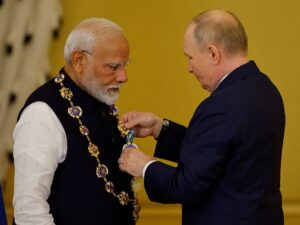
STOCKHOLM: In an unexpected twist, Nobel medicine laureate Fred Ramsdell discovered he had won the prestigious award while on a camping trip in the Rocky Mountains. Ramsdell, who shared the 2025 Nobel Prize in Physiology or Medicine with fellow American scientist Mary Brunkow and Japan’s Shimon Sakaguchi, was unreachable as he was off-grid with his wife, Laura O’Neill.
The Nobel Assembly attempted to contact Ramsdell to inform him of the accolade for his groundbreaking work on the immune system. However, he was out of reach, enjoying nature’s solitude. It was only when O’Neill checked her phone, after a brief scare thinking she had spotted a grizzly bear, that they realized the magnitude of the news.
“You just won the Nobel Prize!” O’Neill exclaimed, as reported by The New York Times. Ramsdell, whose phone was on flight mode, initially dismissed the idea until O’Neill showed him the flood of congratulatory messages. “I certainly didn’t expect to win the Nobel Prize,” Ramsdell later remarked from a hotel in Montana.
Breakthrough in Immune System Research
The trio was recognized for their work in understanding how the immune system spares healthy cells, a discovery that opens doors for potential new treatments for autoimmune diseases and cancer. Ramsdell serves as a scientific adviser at Sonoma Biotherapeutics in San Francisco, while Brunkow is a senior program manager at the Institute for Systems Biology in Seattle. Sakaguchi is a professor at Osaka University in Japan.
Marie Wahren-Herlenius, a rheumatology professor at Sweden’s Karolinska Institute, explained the significance of their research. “Their discoveries relate to peripheral immune tolerance, or how we keep our immune system under control so we can fight all imaginable microbes and still avoid autoimmune disease,” she said.
“The institute said all three laureates brought to the fore so-called regulatory T cells, a class of white blood cells that act as the immune system’s security guards.”
Unexpected Reactions and Historical Parallels
Ramsdell’s reaction was not unique in the history of Nobel announcements. In 2016, Bob Dylan famously ignored his Nobel literature prize for weeks, and in 2011, a medicine prize was announced only to find that one of the winners had passed away days earlier.
Brunkow discovered her win in a similarly unconventional manner, being alerted by her dog’s barking at a news photographer. She highlighted the importance of their work, which isolated a gene called FOXP3, a marker for regulatory T cells. “They’re rare, but powerful, and they’re critical for sort of dampening an immune response,” she said.
Sakaguchi expressed his surprise at a press conference in Osaka, Japan, noting that he expected recognition only after further advancements. “I used to think that some sort of reward may be forthcoming if what we have been doing will advance a little further,” he stated.
Future Implications and Broader Impact
The implications of their research are vast, with potential applications in developing treatments that could transform cancer from a feared disease to a manageable condition. Sakaguchi, during a call with outgoing Japanese Prime Minister Shigeru Ishiba, expressed optimism about the future of immunotherapy in cancer treatment.
“I believe the time will come when cancer is no longer a scary disease, but a curable one,” Sakaguchi said.
As the laureates prepare to receive their prize of 11 million Swedish crowns ($1.8 million) and a gold medal from Sweden’s king, the scientific community continues to celebrate their contributions. Meanwhile, the Nobel Prize in Physics was awarded to three scientists for their work on quantum tunnelling, highlighting the diverse and groundbreaking achievements recognized by the Nobel committees this year.






